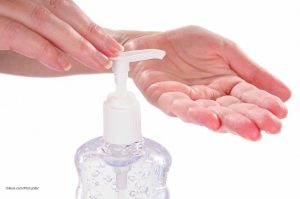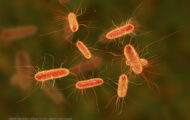The FDA is taking a closer look at antibacterial soaps. Their issue is with ingredients called triclosan and triclocarbon, chemicals that may act as hormone disruptors. And those ingredients don’t have any proven health benefit; they don’t kill any more bacteria than plain old soap and water.
 There is no evidence that over the counter antibacterial soaps are more effective at preventing illness than ordinary soap and water. Dr. Colleen Rogers, a lead microbiologist at the FDA said, “new data suggests that the risks associated with long-term, daily use of antibacterial soaps may outweigh the benefits.” The soaps may also contribute to the serious problem of antibiotic resistance.
There is no evidence that over the counter antibacterial soaps are more effective at preventing illness than ordinary soap and water. Dr. Colleen Rogers, a lead microbiologist at the FDA said, “new data suggests that the risks associated with long-term, daily use of antibacterial soaps may outweigh the benefits.” The soaps may also contribute to the serious problem of antibiotic resistance.
The government issued a proposed rule on December 13, 2013 that would require manufacturers to provide more substantial data to demonstrate the safety and efficacy of antibacterial soaps. The rule doesn’t apply to hand sanitizers, hand wipes, or antibacterial soaps used in health care settings. Currently, lab tests used to evaluate the effectiveness of antibacterial soaps don’t test the effect of a product on infection rates. Animal studies have shown that triclosan may alter the way hormones work in the body.
You can tell if a product contains triclosan because it will have the word “antibacterial” on the label. The ingredient list will contain triclosan or triclocarbon. There may also be a “Drug Facts” label on the product. Cosmetics must list ingredients contained in the product, but are not required to carry a “Drug Facts” label.
The FDA and EPA are working together on the science and regulatory standards about this issue. EPA regulates the use of triclosan as a pesticide and is updating its assessment of the effects of triclosan used in this way.
FDA still stresses that thorough hand washing with warm water and ordinary soap is the best way to keep your food and family safe. Wash your hands for at least 20 seconds after using the bathroom, changing diapers, and handling raw meats or eggs. And wash your hands before preparing food and before you eat. And wash your hands more often if you or someone in your family are sick.





I have never been able to tolerate anything that contains Triclosan or Microban. They give me a severe migraine, burning eyes, nose, throat, lungs and make me short of breath, among other serious symptoms. I can’t use anything that contains them, or even be around anyone else who is using those chemicalsl. Many filters contain Triclosan, like air cleaners, and a lot of other kinds of products. That stuff in everywhere. Many other people have said they can’t tolerate Triclosan, Microban, and such. I have Hashimoto’s autoimmune hypothyroidism, and recently found out that Triclosan is bad for the thyroid, too. So, I’m glad I could never be around it.